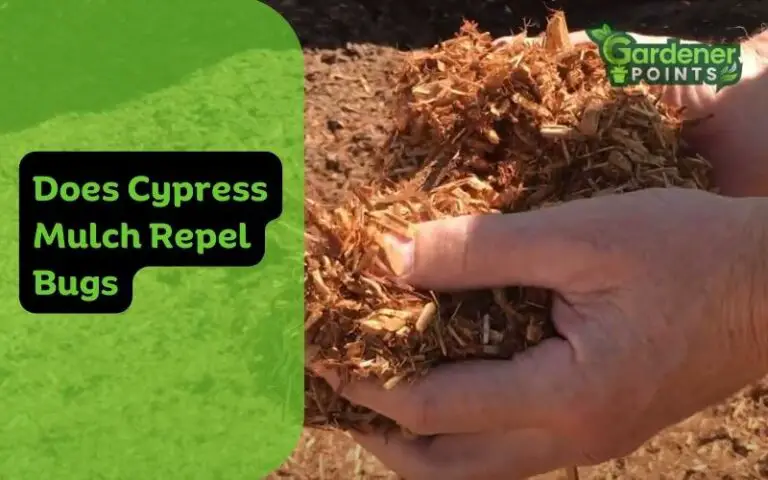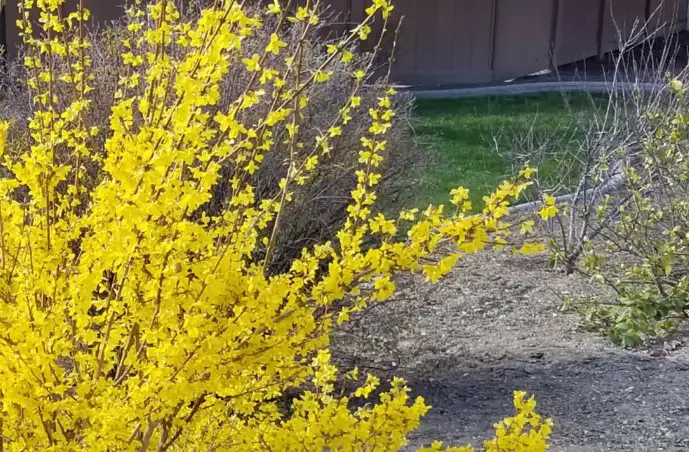How to Make Bermuda Grass Thicker? (Easy Ways To Follow)
Bermuda grass has a good amount of resistance and tends to grow firmly in various hard situations. But the growth might be lacking, which causes the grass to grow thinner and lighter in color.
If you want Bermuda grass to grow thicker, you must mow, water, and fertilize it in accordance with a set schedule. Along with that, you must aerate, eliminate weed growth, treat the pH of your soil, lessen shade, etc. to completely cover the surface of your backyard with thick, emerald-green Bermuda grass.
Today, we’re covering all the necessary steps you can take to have thicker Bermuda grass soon.
Does Frequent Mowing thin the grass?
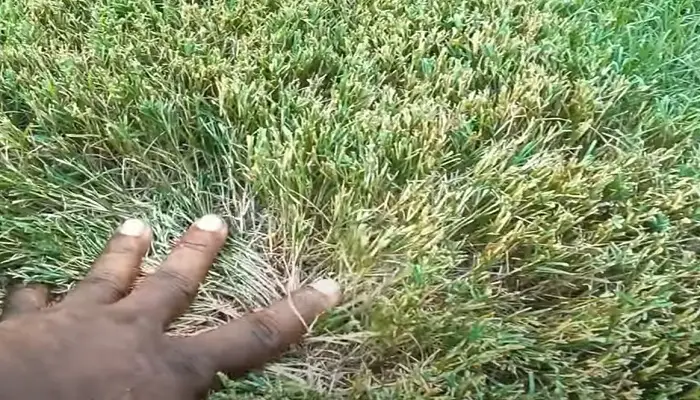
Obviously, frequent mowing thickens most grass types in your backyard. When you trim the top of the grass, the plant body gets motivated to grow laterally.
Along with that, stopping the grass from growing more than a fixed height makes the roots stronger, which produces more nutrition from below for better development.
But here’s a catch. Some grass types grow slowly. You don’t have to mow them or cut their height too often.
You need to know the growth rate of the grass in your lawn and then decide how many times a week the grass needs mowing.
Read Also: How To Get Rid of Forsythia – Will Vinegar Kill It?
What Causes Thinning Bermuda Grass?
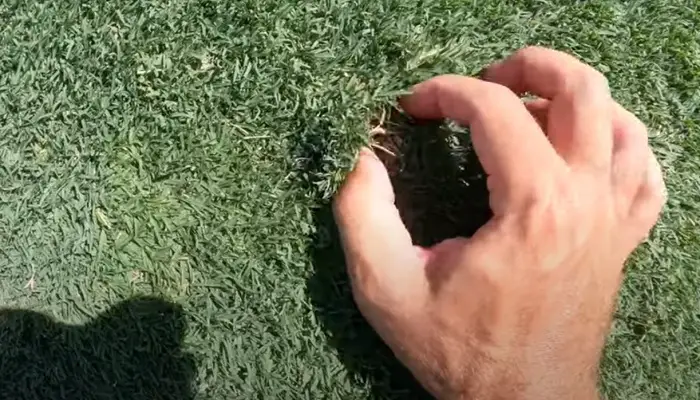
There are some specific reasons why you can see Bermuda grass growing thinner than before. Among them, the most common issues are:
- Lack of nutrition
- Too much shading
- Weed attack
- Bad soil or soil pH
- Insect attack
How to Make Bermuda Grass Thicker?
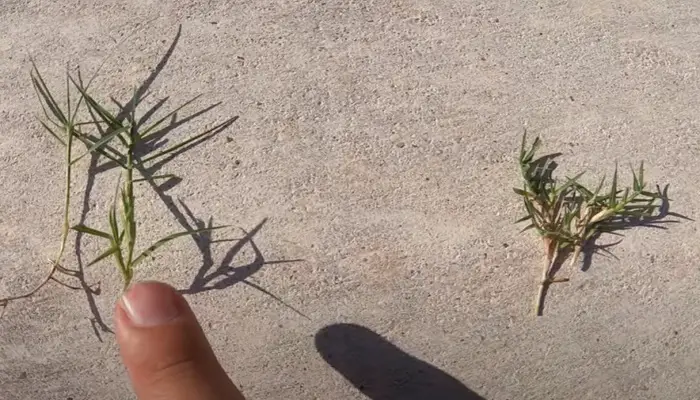
Now, let’s cut to the chase and explain the 7 most important steps to take for making Bermuda grass thick.
Mow once every week
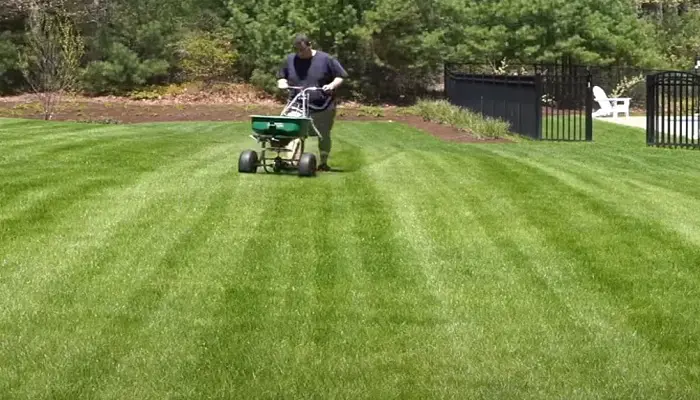
As said earlier, mowing is one of the primary ways to encourage the growth of grass. You should try to mow your lawn once every weekend.
Make sure that you don’t cut more than 1/3rd of the grass. We always recommend a height of slightly less than 1 inch for Bermuda grass.
Don’t keep your lawn dry
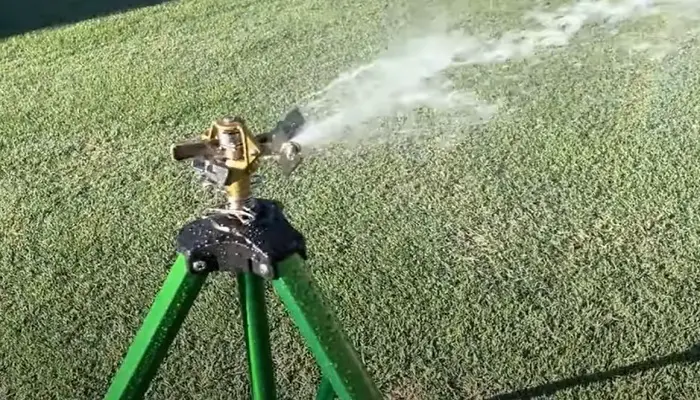
Have you ever seen a tree grow without water? Surely, you need to water the whole yard once a week.
As Bermuda grass requires 1 inch of water, you should carefully set the sprayer of the water pipe in the right mode and pour water evenly.
Note: as both mowing and watering are required once every week, don’t perform both on the same day. Try to keep at least a 3-4 days gap between these two tasks.
Use nitrogen-rich fertilizers
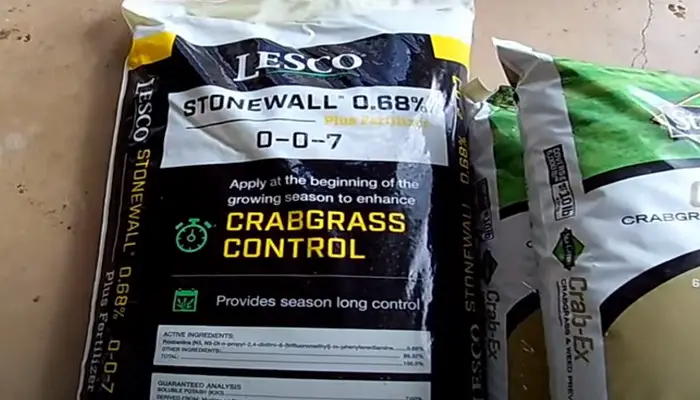
Nitrogen is one of the most anticipated components for the existence of chlorophyll.
Besides, nitrogen can increase the density of grass and other plants quite easily. That’s why we suggest using 28-0-0 nitrogen fertilizer at the start of May.
But it is always good to test the soil to know if the surface needs anything more than only nitrogen (ex. phosphorus, potassium, etc.). In that case, you should look for a 16-4-8 fertilizer package.
Do something of the weed
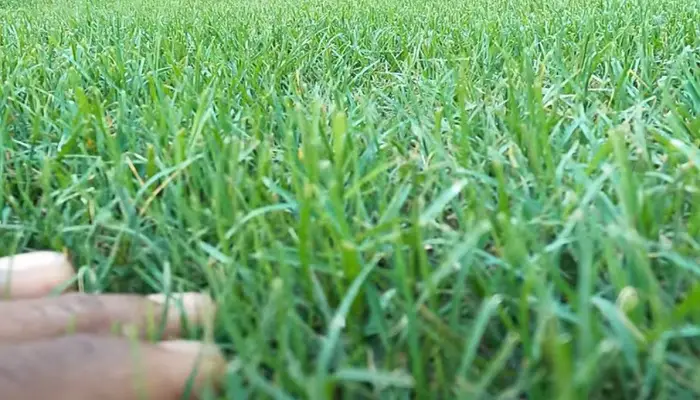
Weeds always compete with grass for food and nutrition. You must not only kill the existing weeds but also prevent them from growing further. There are several pre-emergent herbicides available on the market.
Get a good one for the Bermuda grass lawn and use it in early February to create a protective layer over the ground. Next up, use a mild weed killer directly before using fertilizers to kill existing weeds.
Hopefully, the effects of the weed-killing sprayer would go off within 1-2 weeks, and you can find your lawn ready to get nurtured once again
Keep your soil’s pH in check
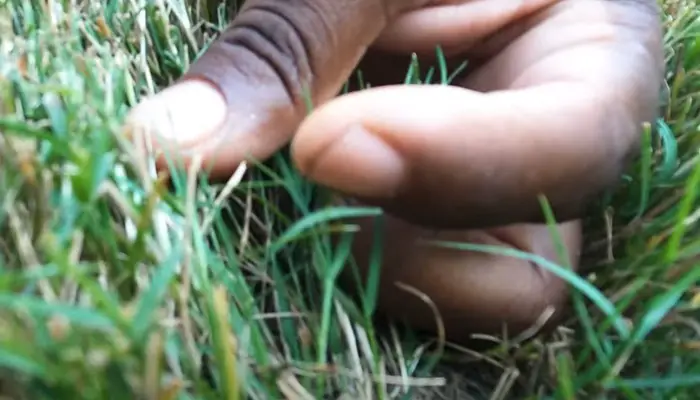
Soil pH under 5.8 or over 7 becomes harmful for Bermuda grass. Purchase a pH kit and test the soil before bringing any huge changes. If the soil is acidic (<5.8), use lime. And use sulfur when the ph is above 7.
Don’t forget to aerate
Aeration of any type of lawn once every year is recommended. By aerating the soil, grassroots get access to go deeper and store energy as much as they require.
You can do aeration for Bermuda grass growth in the last weeks of spring or early days of summer to finish the job without hurting any growing grass.
Overseed if possible
After aeration, you get to find several spaces to seed new grass and make it look much more dense than before. If the aeration is done in late spring, place Bermuda seeds in large quantities and water the area properly. After 4 weeks, you’d see new and thick Bermuda grass growing well.
Best Fertilizer To Thicken Grass
Now that you know the ways to fill your lawn with thick and dense Bermuda grass, it’s time to show you the top 3 fertilizers to improve the growth of your lawn grass.
1. Simple Lawn Solutions 28-0-0 liquid
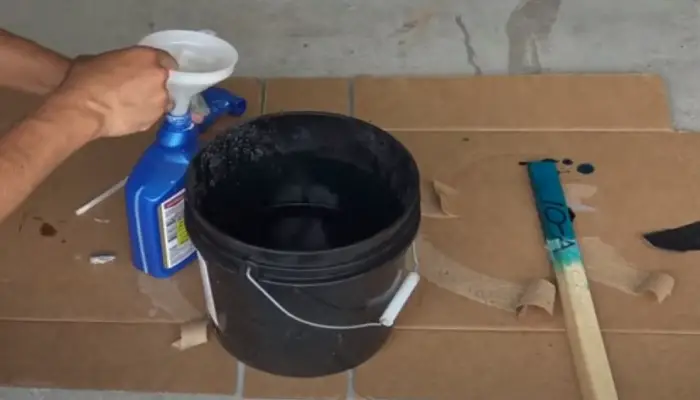
When you see your soil is not in a very bad situation, yet the grass is getting thinner, you can use Simple Lawn Solutions 28-0-0 liquid fertilizer. It only fills the nitrogen requirement that your lawn soil fails to provide.
Key Features:
- Provides more nitrogen to increase density
- Eradicates nitrogen deficiency and color fading within no time
- Good for all types of grass
2. Prevengenics 16-4-8 liquid
We’re suggesting this product for those soils that have become quite a mess. In short, Prevengenics 16-4-8 is to completely rebuild a lawn that has soil with a very small amount of nutrients.
Key Features:
- Offers Iron, L-Amino Acids, and Fulvic Acid along with Potassium, Nitrogen, and Phosphorus
- Easy to mix and use
- Slow yet efficient performance featured
3. Simple Lawn Solutions Advanced 16-4-8 liquid
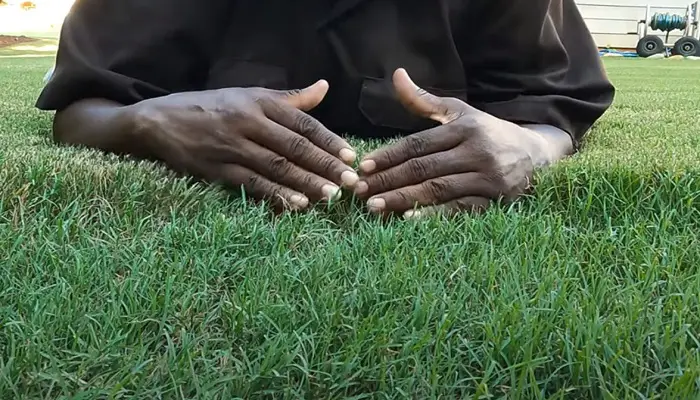
The simple Lawn Solutions Advanced 16-4-8 provides a balanced ratio of macronutrients that make it a good-to-go for most lawns or soils. By using the right quantity of this liquid, any grass can gain proper development, growth, and lifespan.
Key Features:
- Complete macronutrient combo comes with seaweed and fish
- Good for all grass types
- Helps to develop grassroots
Read Also: Does Cypress Mulch Repel Bugs & What Mulch Do It Best?
Frequently Asked Questions (FAQs):
Lastly, let’s answer some more relevant questions so that you won’t find making Bermuda grass thicker too difficult to do by yourself.
What Type of Soil to Use for Bermuda Grass?
Bermuda grass prefers soil that is somewhat alkaline. Acidic soil isn’t too good for Bermuda growth. The pH of an area’s soil should be higher than 5.8 to grow Bermuda grass.
How fast does Bermuda grass grow?
If you sow Bermuda seeds at the right time, you can expect to see dense and green Bermuda grass within 1-1.5 months.
Is Bermuda easy to grow?
Yes, you can easily grow Bermuda grass, even in the least decent location. The high tolerance of this species makes it a tough survivor in many places on earth.
What Type fertilizer makes Bermuda grass thicker?
One of the best fertilizers to make your Bermuda grass thicker would be compost or fertilizer that actually has nitrogen in it. This type of fertilizer is also known as “organic” because it isn’t artificial or based on chemicals like traditional granular fertilizers.
How to make Bermuda grass thicker through shade trees?
To thick Bermuda grass becomes, you can plant shade trees to help Bermuda grass thickens over time. Shade trees give off extra nutrients like nitrogen which helps promote how healthy Bermuda grass becomes.
How to how thick Bermuda grass with pollinators?
One of the best ways to thick Bermuda grass is by using pollinators like bees. Bees love how moist soil is, such as planting shade trees or other types of plants around Bermuda grass should encourage how thick it gets.
Final Talks
How to thick Bermuda grass by giving it more water, planting shade trees, and using pollinators like bees.
If you’re looking for the solution on how to thick Bermuda grass, then give one or more of these solutions a try and see how they work out for you!

Say hello to Afrabby – your go-to research expert turned gardening expert, lawn care aficionado, and a skilled lawn mower mechanic! With years of hands-on experience and a passion for cultivating lush green landscapes, Afrabby is your partner in achieving the lawn of your dreams.
Whether you’re seeking expert advice on plant selection, weed control, or optimal mowing techniques, Afrabby’s got you covered. Equipped with the knowledge to diagnose and fix mower troubles, your lawn equipment is in safe hands. Let Afrabby transform your outdoor space into a stunning oasis you’ll love to show off!

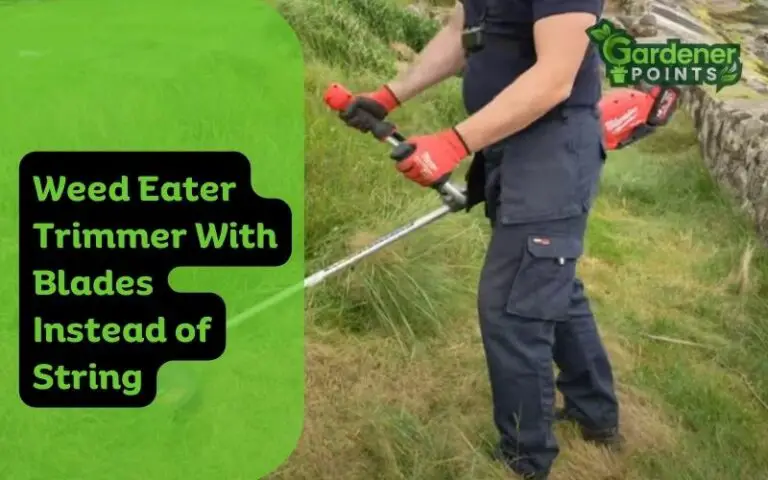
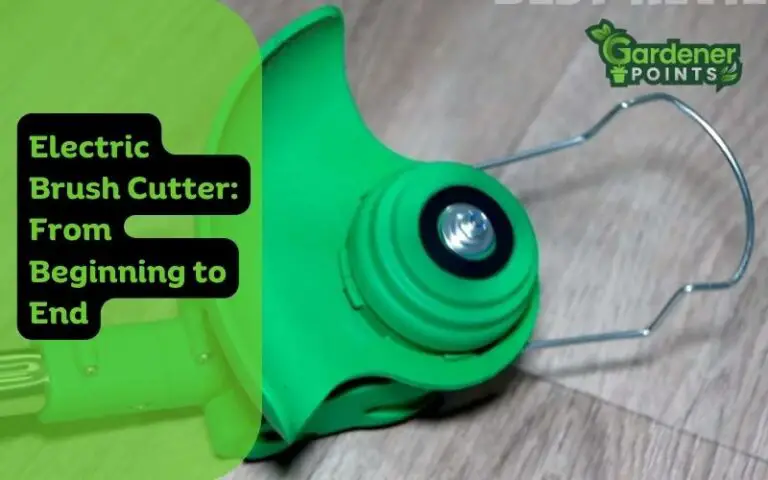

![Best Electric Brush Cutters: [Top 5 Options to Grab in 2023]](https://gardenerpoints.com/wp-content/uploads/2023/08/Best-Electric-Brush-Cutters-768x480.jpg)
